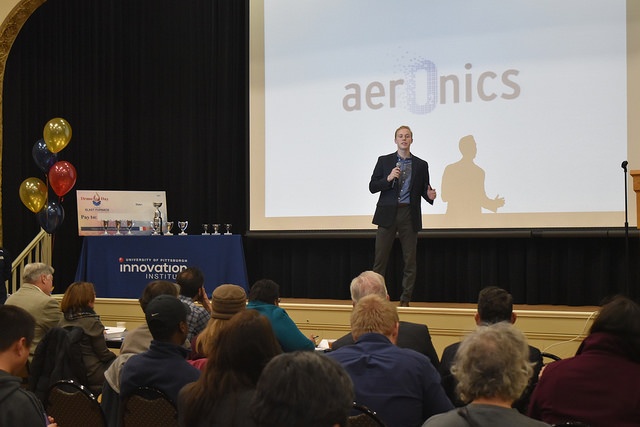
Blake Dube's transformation from undergraduate engineering student into CEO of his own company, Aeronics, happened in a rapid-fire manner when he and fellow students Mark Spitz and Alec Kaija were encouraged by their professors to explore the commercial potential of their research. They took full advantage of the programs and resources available through the Innovation Institute and its Big Idea Center for student entrepreneurship. Aeronics won prizes in the Randall Family Big Idea Competition, the Michael G. Wells Healthcare competition, the Kuzneski Innovation Cup. They participated in the Blast Furnace accelerator and received guidance and support from several mentors and entrepreneurs in residence. They also received support from the greater Pitt innovation ecosystem, including winning a prize in the Pitt Innovation Challenge (PInCh).
Upon graduating, they were selected to participate in a 14-week Quake Capital accelerator program in New York City where they continued to explore the market potential for the portable oxygen devices they are developing. The company recently launched its first product, Everyday Oxygen. In this post, Dube answers questions about his unexpected entrepreneurial journey and how Pitt helped him succeed.
1. Did you come to Pitt with the idea of becoming an entrepreneur?
I did not. The idea of being an "entrepreneur" was very much an abstract concept to me at the time. I was focused on learning the fundamentals of engineering, which eventually gave me the tools and mindset to start thinking about how I might make an impact. Entrepreneurship was never really the primary motivation, but it became the best route through which I could use what I learned to solve problems.
2. What people and resources at Pitt influenced your trajectory at the University?
My professors were a big part of my success at Pitt. I think it can be hard to look up from the course work and start thinking about how you want to apply what you've learned in a professional setting. It's comfortable to stay in your lane, but professors like Dr. Chris Wilmer and Dr. Eric Beckman encouraged me to try new things, starting with the research that would eventually lead to our product. I was able to leverage my classes to explore my own ideas, and every one of my professors along the way shared in my enthusiasm. The mindset was to enable. Our introduction to the Innovation Institute came in the form of the Randall Family Big Idea Competition, which helped validate our idea and provide us with the resources to dive deeper. That's where we met Babs Carryer, who has continued to be a valued mentor. Countless people at the Innovation Institute have helped us along the way, contributing to the support network of Pitt as a whole that we continue to rely on.
3. At one point, you faced a crossroads of accepting a job with a big company or forging ahead with Aeronics. Why did you decide to stay on the entrepreneurship path?
I chose Aeronics because I believed, and continue to believe, that we are making something that will have a positive impact on people. There are plenty of great jobs at larger companies that offer the same opportunity to make a positive impact, but after spending more than a year with our customers, mentors, and supporters, it became evident to me that this specific opportunity needed my immediate, full attention to succeed.
4. For those who would choose to join a large organization after having experience as an entrepreneur, how could that experience help their career?
I'm not entirely sure yet, I'll have to let you know! I think there is definitely value in what you learn starting your own business. Skills that would normally be siloed at a large company (marketing, sales, investor relations) are all fair game at a startup, so I think you come out of the experience with a mind set that allows you to create value in various areas, which I imagine would be appreciated and utilized at a larger organization.
5. What is your advice to Pitt students who are unsure of, or intimidated by the idea of pursuing entrepreneurial learning experiences through the new Big Idea Center?
My advice is to try everything because there is very little downside. As a student, the worst that can happen is learning that something is not for you, and that's actually a great outcome. It's also a great way to grow your network outside of your major. You don't have to have an idea or invention to participate in these things. For every invention, there's an engineer who's not sure how to use it, and there's a business or graphic design student who has the missing link! There are all kinds of clubs that facilitate these interactions, but Big Idea Center is great because it has the resources to catalyze these interactions into meaningful experiences.
The Big Idea Center will host the first Blue Hack, sponsored by IBM (parent company of the Watson artificial intelligence platform) on October 13 and 14. This idea generating event is open to all students, including graduate students, and does not require coding skills. Food will be provided both days and cash prizes will be awarded.
